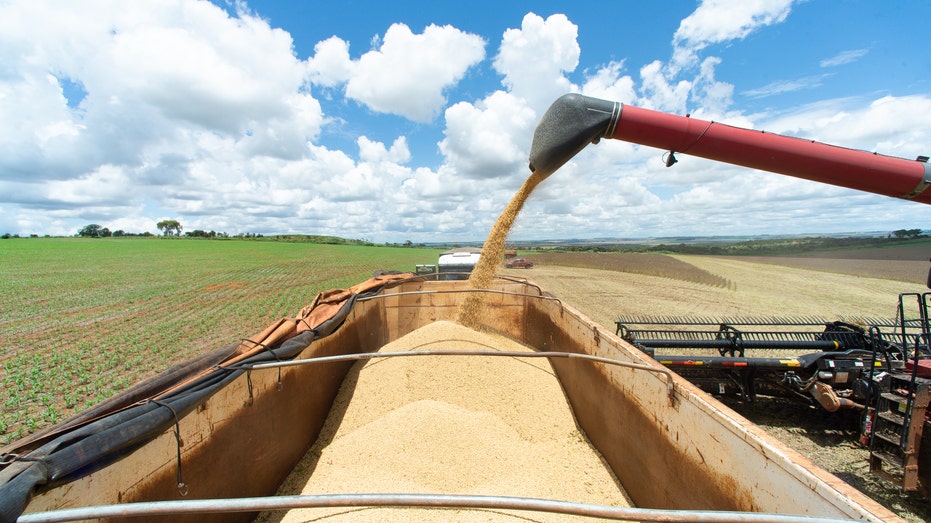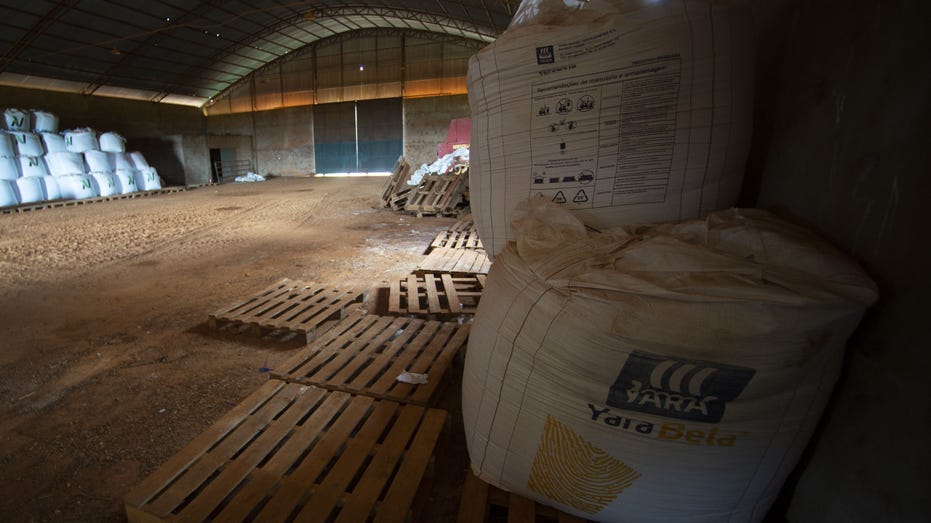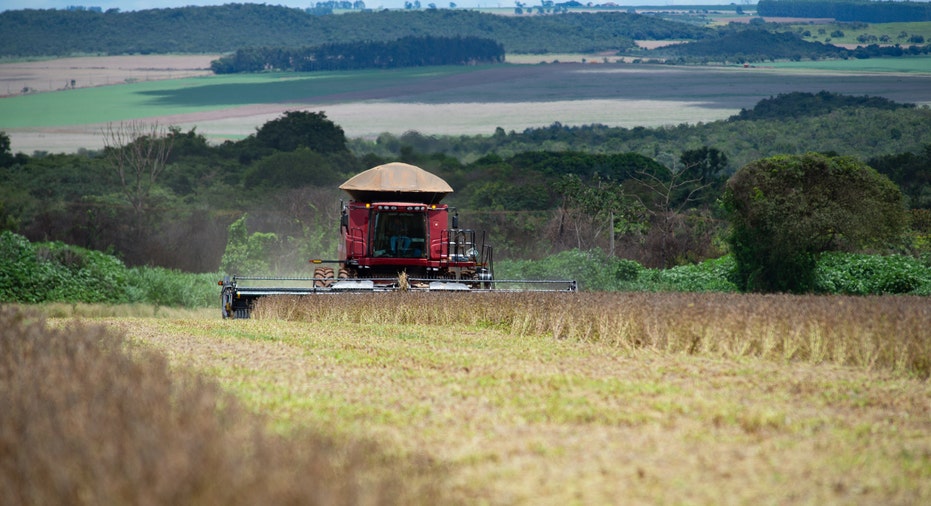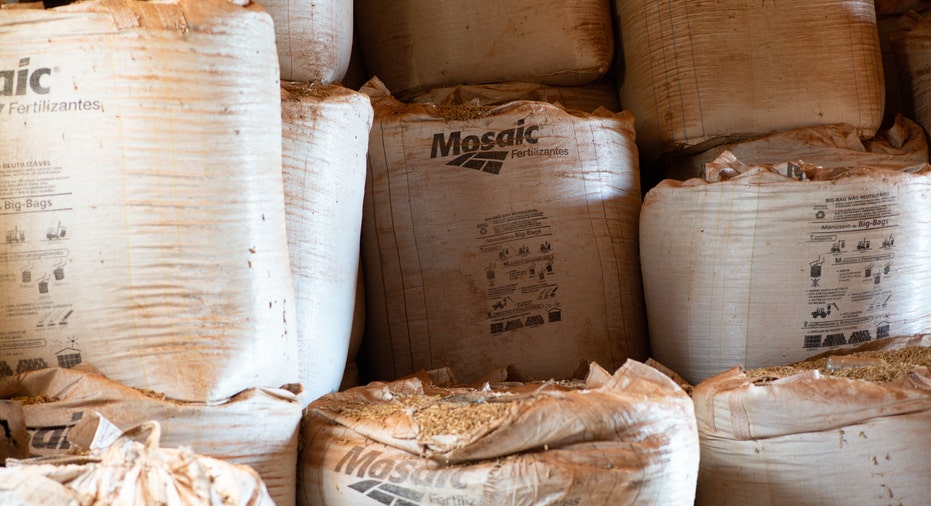Ukraine war hits farmers as Russia cuts fertilizer supplies, hurting Brazil
Global food prices were already at around a 10-year high before the Russian invasion of Ukraine
Democrats are equally frustrated with Biden administration on Russian oil ban: Panel
South Carolina Rep. Nancy Mace and former Council of Economic Advisers chairman Tomas Philipson weigh in on solutions to surging gas prices on 'The Evening Edit.'
Brazil is searching for new fertilizer suppliers as the war in Ukraine threatens to cut off shipments to one of the world’s breadbaskets, with potential ripple effects on already high global food inflation.
The Latin American country is the largest producer of coffee, soybeans and sugar, and the most dependent of the world’s agricultural superpowers on imported fertilizer. Brazil imports some 85% of its fertilizers and about a fifth of those imports come from Russia. The Russian trade ministry has called for a broad suspension of fertilizer exports, state news agency TASS reported Friday.
"Brazil depends on fertilizers…it’s a sacred question for us," President Jair Bolsonaro told reporters earlier this week, defending his decision to maintain cordial relations with Moscow as Russia attacks Ukraine. Mr. Bolsanaro was one of the last world leaders to visit Russian President Vladimir Putin before the invasion of Ukraine began on Feb. 24, meeting with him at the Kremlin on Feb. 16.
If Brazil’s farmers have to pay significantly more for fertilizer or are unable to produce as many crops, the cost of its agricultural products is likely to climb, driving up world food prices.
Brazil is also an important supplier of corn and beef. Higher grain prices increase animal-feed costs, which are passed on to consumers, who have to pay more for meat and other animal products.
UKRAINE WAR: DOJ LAUNCHES TASK FORCE TO TARGET RUSSIAN OLIGARCHS, SEIZE ASSETS
Before the Ukraine conflict, farmers across the world were struggling to buy enough fertilizers, some of which more than doubled in price last year. Higher natural-gas prices hampered production of the ammonia needed for nitrogen fertilizers, while power outages at Chinese fertilizer plants and Hurricane Ida in the U.S. curtailed global production.
War in Ukraine and sanctions on Russia have made the situation worse, industry analysts said, raising the prospect of a prolonged global supply crunch that would further stoke inflation and hunger among the world’s poor.
Russia, which accounts for about two-thirds of the world’s ammonium nitrate production according to commodity analysts at S&P Global, has halted exports until April to guarantee supplies for farmers at home. Higher natural-gas prices as a result of the conflict have also pushed up prices for the product, which is used to increase the yields of crops such as corn and wheat.

Soybeans are harvested on a farm near Brasilia, Brazil, on Friday, March 4, 2022. (Andressa Anholete/Bloomberg via Getty Images / Getty Images)
"No one knows what’s going to happen," said Ricardo Arioli, a soybean farmer from Brazil’s center-west state of Mato Grosso. "War means a total lack of certainty. The cost of production becomes a big unknown," he said.
Brazilian Agriculture Minister Tereza Cristina Dias said she was planning to travel to Canada this month to secure more supplies. Canada is the world’s largest producer of potash fertilizers, followed by Russia and Belarus.
Ms. Dias said Brazil has enough stocks to last farmers until October. Not everyone agrees.
The Brazilian National Fertilizer Association, which represents fertilizer companies in this country, has warned that local fertilizer stocks will only last for another three months. Sanctions and travel restrictions have hampered shipments to Brazil, the group said.

Fertilizer stored in a warehouse at a farm near Brasilia, Brazil, on Friday, March 4, 2022. (Andressa Anholete/Bloomberg via Getty Images / Getty Images)
"We are now experiencing firsthand what it means to depend on imported fertilizer," said Jeferson Souza, a fertilizer analyst at Agrinvest Commodities, a brokerage in Brazil. Sluggish productivity has kept Brazil from developing a bigger domestic fertilizer industry, he said.
Brazil’s government said it would launch a national fertilizer plan to stimulate investment in potash and phosphorus mines. It would take years for farmers to reap any benefits, analysts said.
AS RUSSIA SANCTIONS INTENSIFY, SEVERAL OLIGARCHS SPEAK OUT AGAINST UKRAINE WAR
Global food prices were already at around a 10-year high before the Russian invasion of Ukraine, as the coronavirus pandemic hampered shipments and heavy rains in some growing regions curtailed production. That is translating to higher rates of hunger among the world’s poorest families, who are also dealing with the economic impact of the pandemic, national governments and aid groups have warned.
A Case IH combine harvests soybeans on a farm near Brasilia, Brazil, on Friday, March 4, 2022. | Getty Images
The problem is particularly acute in Latin American countries such as Brazil, where inflation is pushing up daily costs including rent and electricity, leaving families with even less cash for food. By the end of 2020, one in three people in Latin America and the Caribbean—226 million people—were unable to afford a nutritious diet or were skipping meals to feed their children, said Julio Berdegué, regional representative for Latin America and the Caribbean at the Food and Agriculture Organization of the United Nations.
That was before food inflation gripped the region. "It would be a miracle if the situation doesn’t get worse," Mr. Berdegué said.
Higher fertilizer costs also prevent Brazil’s farmers from increasing production of grains to make up for shortfalls from Ukraine and Russia, a major growing area.
GET FOX BUSINESS ON THE GO BY CLICKING HERE
"Brazil has the technology to produce," said Antonio Galvan, a farmer and head of Brazil’s Soybean Producers Association. "Now with these embargoes, the price of fertilizers could go up so much that it’s not even worth planting."






















